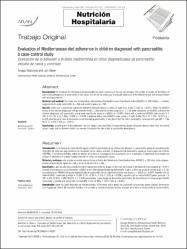Evaluation of mediterranean diet adherence in children diagnosed with pancreatitis: A case-control study [Evaluación de la adhesión a la dieta mediterránea en niños diagnosticados de pancreatitis: Estudio de casos y controles]
Abstract
Background: the incidence of childhood acute pancreatitis has been increasing in the last two decades. The number of studies on the effects of diet on the pathogenesis of pancreatitis is very small. The aim of this study was to evaluate adherence to the Mediterranean diet among children with acute pancreatitis. Material and method: this study was conducted by administering the Mediterranean Diet Quality Index (KIDMED) to 100 children —children diagnosed with acute pancreatitis (n = 50) and a control group (n = 50). Results: there was a statistically significant difference between groups in terms of body mass index Z-score (p = 0.017). When the KIDMED scores of the children diagnosed with pancreatitis (4.48 ± 2.45) and the control group (6.62 ± 2.18) were compared, the KIDMED scores of the children diagnosed with pancreatitis group were significantly lower (u = 638.5; p < 0.001). Those with a moderate KIDMED index (score: 4-7) (OR: 3.734, 95 % CI, 1.068-13.058, p = 0.039) and those with a poor KIDMED index (score ? 3) (OR: 6.444, 95 % CI, 1.595-26.075, p = 0.009) were found to have an increased risk of developing pancreatitis. It was found that the risk of pancreatitis increased with age (OR: 1.136, 95 % CI, 1.020-1.266, p = 0.021). Conclusion: according to the data obtained from our study, it was found that the pancreatitis group had poorer dietary habits than the control group. Larger and multicenter studies are needed to evaluate the role of diet in pancreatitis development. © 2021 SENPE.
















